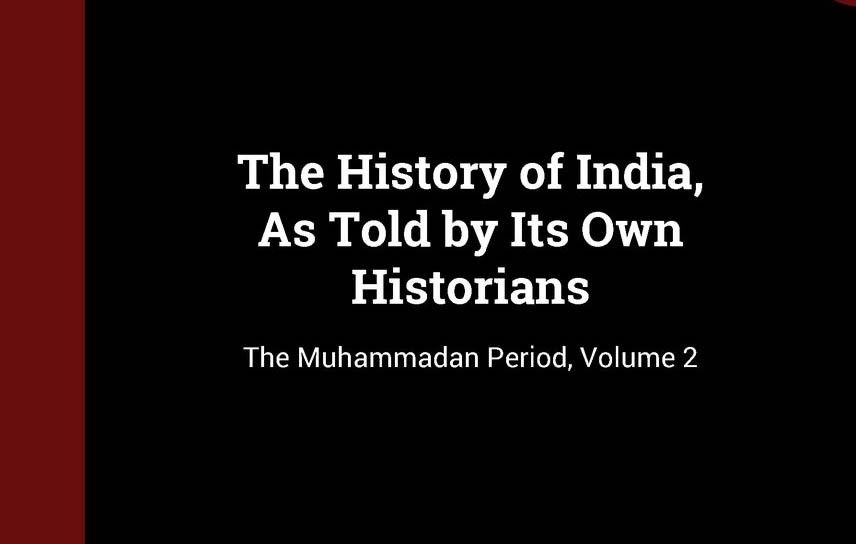
James Mill and Sir Henry Elliot on imperial history

If James Mill was the most influential historian among the educated classes of the subcontinent, it was the historical account, The History of India, As Told By Its Own Historians, that influenced the history buffs most profoundly.
Sir Henry Elliot and John Dowson produced this monumental piece of history comprising eight large volumes.
In fact, Sir Henry Miers Elliot (1808-1853) worked towards perpetuating the tradition of Mill. A graduate of Haileybury College, he rose to be chief secretary in the foreign department of the government of India, and worked with the East India Company in India for 26 years.
Before going to Haileybury College, Sir Henry went to Winchester College when he was 10, and pursued further education at New College, Oxford. It was here that he was attracted to the Indian Civil Service. He was the first of the ‘competition wallahs’ to pass an open examination for an immediate post in India.
His grasp over oriental languages as well as his expertise in classics and mathematics was exceptional. While serving at Meerut, Uttar Pradesh, he brought out a magazine which contained valuable articles on India and Indian people. He published the magazine in 1845 in Agra to assist the projected official ‘glossary of Indian judicial and revenue terms’.
Professor H.H. Wilson described this publication as, "replete with curious and valuable information, especially as regards the tribes and clans of Brahmans and Rajputs".
Sir Henry’s principal work was the Bibliographical Index to the Historians of Mohammedan India, where he analysed the content and value of 231 Arabic and Persian historians of India. But he only lived to publish the first volume in 1849. In this momentous undertaking, he received help from John Dowson (1820-1881), professor of Hindustani at the University College London.
The remaining seven parts of this voluminous endeavour in history writing came to fruition because of Dowson’s consistent hard work.
Sir Henry did not write any formal history but in the preface to The History of India, As Told By Its Own Historians, he poured scorn on the Mohammedan government in India as James Mill did on the Hindus. In the process, he relegated to the background more sober, more sympathetic interpretation done by Elphinstone.
He wrote in his preface that the material that he had collected on medieval Indian history would make "our native subjects more sensible of the immense advantage accruing to them under the mildness and equity of our rule."
As mentioned before, this project of Sir Henry and Dowson had a very profound influence on Indian historiography since most of the subsequent histories on medieval India (when Muslims ruled the subcontinent) drew heavily on these volumes of The History of India, As Told By Its Own Historians. Equally significant was the effect of Sir Henry’s preface on British officials working in India, from viceroy downwards.
It would be pertinent to quote C.H. Philips to elucidate the impact of these two on thoughts and actions of British officials: "they were all agreed that the happiness of the governed which might be ensured by a strong exact government and the rule of law was more important than self-government." There is hardly any doubt that the tradition of history writing bequeathed by Mill bred a sense of imperial dogmatism and self-assuredness in the British Indian administration.
Imperial dogmatism and self-assuredness drew their strengths from certain notions and pseudo-scientific theories prevalent in the late 19th century Europe. One of these was the idea of racial superiority.
According to James Joll, the belief that the white races are superior to the black or yellow races was the fundamental assumption of the confident imperialism of the late 19th Century. Former Prime Minister of England, Lord Rosebery, once exclaimed with nonchalance typical of British imperialists that "what is empire but the pre-dominance of race."
The belief in racial superiority was systematically nurtured through some pseudo-scientific evolutionary theories such as the ‘survival of the fittest’, the Aryan master race, and social Darwinism. Since white races could overpower non-whites in war, they were deemed superior human specimens than coloured men and women. Concomitantly, in the minds of the British imperial administrators, this racial superiority carried with it a mandate to rule over those thought to be racially inferior.
The imperialist argument predicated on the white man’s special right to rule was provided a moral and humanitarian cover. The Christian missionary was altruistically eager to save heathen souls from the certainty of hell. Thus imperialism was justified because of its perceived humanism which could bring about good governance, education, material amelioration and moral elevation of the colonised.
Rudyard Kipling in his poem, The White Man’s Burden (1899), stated this quite succinctly:
Take up the White Man’s burden -
Send forth the best ye breed -
To serve your captives’ need;
Your new-caught sullen peoples,
Half devil and half child.
So, the historical perspective and intellectual validation of imperialism, as well as superiority of the white race, was provided by the likes of James Mill and Sir Henry Elliot. One can very easily decipher the seminal role of history and historiography in enhancing the imperialist cause. The History of India, As Told By Its Own Historians served the imperialist cause in the most effective manner in order to help imperial administrators break away from the inherent shackles of imperialism.
This discussion on the role of historians in shaping the colonial empire’s legitimacy sums up one of the root problems in our national intellectual ethos. James Mill and Sir Henry Elliot’s work demonstrates that only history can be the decisive instrument in shaping the intellectual and philosophical outlook of any society or dispensation. Dispassionate analysis of history is the only way forward. The earlier we understand it, the better.